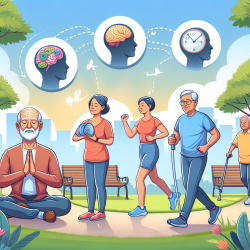Aging stigma is a pervasive issue that affects the health and wellbeing of older adults. Recent research by Allen and Sikora (2023) highlights the complex ways in which aging stigma impacts health outcomes among US adults over 65. As practitioners working with this population, understanding these dynamics is crucial for improving care and promoting positive health outcomes.
Understanding Aging Stigma
Aging stigma refers to the negative stereotypes and prejudices associated with aging. These can manifest as internalized beliefs among older adults or as external discrimination in various settings, including healthcare. The research identifies several mechanisms through which aging stigma affects health, such as increased psychological distress, cognitive load, and reduced access to healthcare services.
Health Implications of Aging Stigma
The study reviewed 29 studies conducted between 2010 and 2023, revealing that aging stigma is associated with poor short- and long-term health outcomes. These include:
- Cognitive Decline: Stereotype threat can impair memory and cognitive functioning.
- Psychological Wellbeing: Internalized negative beliefs about aging are linked to higher levels of anxiety and depression.
- Physical Health: Aging stigma contributes to chronic pain and functional decline.
Strategies for Practitioners
Practitioners can play a key role in mitigating the effects of aging stigma by implementing the following strategies:
- Acknowledge and Address Biases: Reflect on personal biases and how they might affect interactions with older patients.
- Create Positive Narratives: Encourage narratives that highlight the strengths and contributions of older adults.
- Promote Inclusive Practices: Design healthcare environments that are welcoming and accessible to older adults.
The Need for Further Research
The research underscores the need for continued exploration into how aging stigma affects health. Future studies should focus on diverse populations to better understand cultural differences in aging perceptions. Additionally, longitudinal studies could provide deeper insights into the long-term effects of aging stigma on health outcomes.
Aging stigma is a significant public health issue that requires attention from both researchers and practitioners. By understanding its impact and implementing strategies to counteract it, we can improve the quality of life for older adults.
Read the original research paper: Aging Stigma and the Health of US Adults Over 65: What Do We Know?










